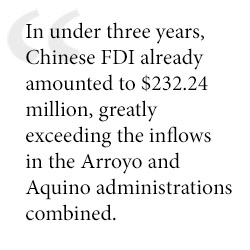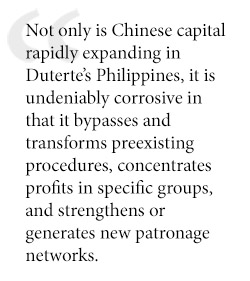Rise of Chinese investments in Duterte’s Philippines: Some consequences

In December 2018, the Philippines recorded foreign direct investments net inflows of $677 million, a 4.8% drop from last year, and its fifth straight month of contraction.
This is a turnaround from when investments continued to post a strong expansion, riding the wave of bullish investor sentiment after ending 2017 with a record-high $10.3 billion.
During the first half of 2018, FDI was among the few bright spots amid the high inflation rate and the disappointing economic growth. Yet it eventually succumbed to the overarching storyline of 2018—missed targets. For the full year, FDI reached $9.8 billion, 4.4% smaller year-on-year and $600 million short of the government target.
In 2018, the bulk of equity capital placements were sourced from Singapore, the US, Hong Kong, Japan and China. Most of these investments went to manufacturing, financial and insurance, real estate, electricity, gas, steam and air-conditioning supply, and arts, entertainment and recreation industries.

Resource-strapped emerging markets welcome the infusion of Chinese capital. With the Philippines embarking on a path geared toward rapid economic expansion, China has stepped in to fill the void in funding requirements.
In 2016, equity placements from China amounted to only $10.77 million, with close to 80 percent accumulated during the second semester of the year. In 2018, Chinese investments have ballooned to $198.68 million, a whopping 590% increase from the $28.79 million posted in 2017. This means that in under three years, Chinese FDI already amounted to $232.24 million, greatly exceeding the inflows in the Arroyo and Aquino administrations combined.
Chinese money, however, should come with caveats. In some countries, China has already used its economic clout to gain political influence, sometimes with disastrous consequences.
On Feb. 21, 2019, Stratbase ADR Institute hosted non-resident fellow, Alvin Camba, as he presented his study exploring whether Chinese capital—particularly FDI in offshore gambling, energy distribution, and artisanal small-scale mining—is corrosive to the Philippines.
Camba argues that not only is Chinese capital rapidly expanding in Duterte’s Philippines, it is undeniably corrosive in that it bypasses and transforms preexisting procedures, concentrates profits in specific groups, and strengthens or generates new patronage networks.

The phenomenon is best exemplified by the speedy rise of the offshore gambling industry, with the proliferation of its corrosive effects, including the migration of illegal workers and the skyrocketing real estate prices, which has priced Filipinos out of prime real estate.
With regards to the energy distribution sector, unlike other Chinese state-owned enterprises, the State Grid Corporation of China (SGCC) has had no global controversies.
To date, the SGCC has spent $326 million to expand and modernize the Philippine’s power grids. The company has also invested in its human capital by promoting skills transfers through sponsorship training of Filipino engineers and workers.
In contrast, the artisanal small-scale mining industry is controversial due to its history of abusive mining investments that propagated child labor, environmental degradation, and violence. While some proponents of this practice argue that profits from the industry directly benefit local government units, these industry players freely utilize a corrosive patronage system when doing business in localities, where power, highly concentrated on the elite, skews processes and undermines institutions.
If government statements are to be believed, then it seems to be moving in the right direction. At the end of the day, national interests must still prevail over those of a selected few.
- Latest





























